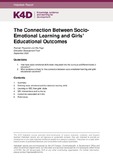| dc.contributor.author | Fitzpatrick, Rachel | |
| dc.contributor.author | Page, Ella | |
| dc.date.accessioned | 2022-10-17T13:01:25Z | |
| dc.date.available | 2022-10-17T13:01:25Z | |
| dc.date.issued | 2022-09 | |
| dc.identifier.citation | Fitzpatrick, R. and Page, E. (2022). The connection between socio-emotional learning and girls’ educational outcomes. K4D Helpdesk Report. Institute of Development Studies. DOI: 10.19088/K4D.2022.154 | en |
| dc.identifier.uri | https://opendocs.ids.ac.uk/opendocs/handle/20.500.12413/17710 | |
| dc.description.abstract | The literature on socio-emotional learning is vast, with a broad range of programmes and interventions spanning multiples ages with a variety of different objectives. A USAID systematic literature review of SEL interventions, identified a broad range of outcomes identified in evaluations of SEL programmes. The majority of the literature on academic outcomes is drawn from high-income contexts, though a small number of studies looking at the impact of girls’ clubs have sought to make a connection between participation in clubs and academic performance (Marcus et al, 2017; Amenya et al, 2021).
Interventions targeting Early Years typically focus on play-based interventions at home and in primary care settings, and on parenting and prenatal skills development and support (Sánchez Puerta et al., 2016). The outcomes of these interventions typically focus on the development of socio-emotional learning skills, parenting behaviours, but also on academic performance (ibid). A World Bank review found that interventions before school were more likely to show favourable results during follow-up.
Aside from the direct academic outcomes, SEL is found to have intermediate outcomes too, particularly in lower-income contexts. For example, girls’ clubs are associated with increased enrolment and retention rates at multiple levels of education (Marcus et al, 2017), in addition to increasing girls’ self-esteem and motivation to learn (Amenya et al, 2021). Other programmes with a focus on SEL have been found to improve career-related outcomes, delay pregnancy and early marriage, and support the development of skills required by the workplace, or advancing prosocial/anti-conflict behaviours (Sánchez Puerta et al., 2016). | en |
| dc.description.sponsorship | Foreign, Commonwealth and Development Office (FCDO) | en |
| dc.language.iso | en | en |
| dc.publisher | Institute of Development Studies | en |
| dc.relation.ispartofseries | K4D Helpdesk Report;1231 | |
| dc.rights.uri | https://www.nationalarchives.gov.uk/doc/open-government-licence/version/3/ | en |
| dc.subject | Education | en |
| dc.subject | Gender | en |
| dc.title | The Connection Between Socio-emotional Learning and Girls’ Educational Outcomes | en |
| dc.type | Helpdesk | en |
| dc.rights.holder | © Crown copyright 2022 | en |
| dc.identifier.doi | 10.19088/K4D.2022.154 | |
| dcterms.dateAccepted | 2022-09 | |
| rioxxterms.funder | Default funder | en |
| rioxxterms.identifier.project | K4D | en |
| rioxxterms.version | VoR | en |
| rioxxterms.versionofrecord | 10.19088/K4D.2022.154 | en |
| rioxxterms.funder.project | 0986883a-6d0f-4bb8-9c46-5e0682934d65 | en |

